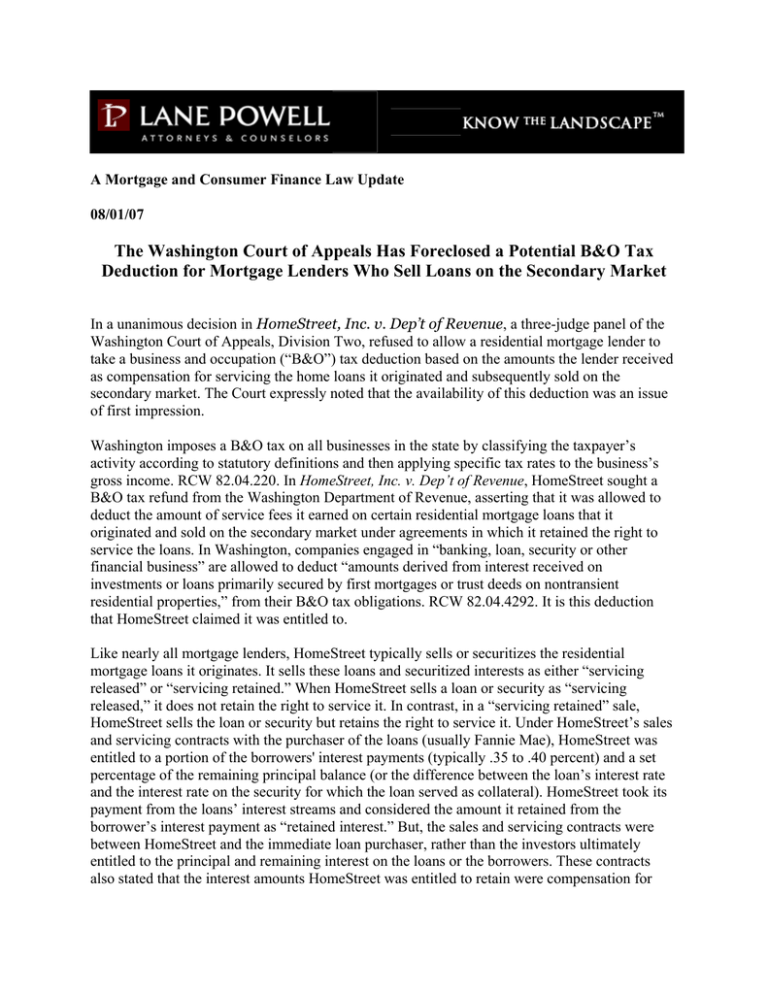The Washington Court of Appeals Has Foreclosed a Potential B&O... Deduction for Mortgage Lenders Who Sell Loans on the Secondary...
advertisement

A Mortgage and Consumer Finance Law Update 08/01/07 The Washington Court of Appeals Has Foreclosed a Potential B&O Tax Deduction for Mortgage Lenders Who Sell Loans on the Secondary Market In a unanimous decision in HomeStreet, Inc. v. Dep’t of Revenue, a three-judge panel of the Washington Court of Appeals, Division Two, refused to allow a residential mortgage lender to take a business and occupation (“B&O”) tax deduction based on the amounts the lender received as compensation for servicing the home loans it originated and subsequently sold on the secondary market. The Court expressly noted that the availability of this deduction was an issue of first impression. Washington imposes a B&O tax on all businesses in the state by classifying the taxpayer’s activity according to statutory definitions and then applying specific tax rates to the business’s gross income. RCW 82.04.220. In HomeStreet, Inc. v. Dep’t of Revenue, HomeStreet sought a B&O tax refund from the Washington Department of Revenue, asserting that it was allowed to deduct the amount of service fees it earned on certain residential mortgage loans that it originated and sold on the secondary market under agreements in which it retained the right to service the loans. In Washington, companies engaged in “banking, loan, security or other financial business” are allowed to deduct “amounts derived from interest received on investments or loans primarily secured by first mortgages or trust deeds on nontransient residential properties,” from their B&O tax obligations. RCW 82.04.4292. It is this deduction that HomeStreet claimed it was entitled to. Like nearly all mortgage lenders, HomeStreet typically sells or securitizes the residential mortgage loans it originates. It sells these loans and securitized interests as either “servicing released” or “servicing retained.” When HomeStreet sells a loan or security as “servicing released,” it does not retain the right to service it. In contrast, in a “servicing retained” sale, HomeStreet sells the loan or security but retains the right to service it. Under HomeStreet’s sales and servicing contracts with the purchaser of the loans (usually Fannie Mae), HomeStreet was entitled to a portion of the borrowers' interest payments (typically .35 to .40 percent) and a set percentage of the remaining principal balance (or the difference between the loan’s interest rate and the interest rate on the security for which the loan served as collateral). HomeStreet took its payment from the loans’ interest streams and considered the amount it retained from the borrower’s interest payment as “retained interest.” But, the sales and servicing contracts were between HomeStreet and the immediate loan purchaser, rather than the investors ultimately entitled to the principal and remaining interest on the loans or the borrowers. These contracts also stated that the interest amounts HomeStreet was entitled to retain were compensation for performing its servicing obligations. Most of HomeStreet’s agreements and other related documentation established that it was conveying all of its interest in the loans themselves. The Court found that the amounts HomeStreet collected were not “amounts derived from interest” within the meaning of the tax deduction because it was only entitled to these amounts by virtue of the contractual relationship with the purchasers of the loans. The Court did, however, acknowledge that when a mortgage lender originates and funds a loan, it creates a relationship that falls squarely within the statutory tax deduction of RCW 82.04.4292. In other words, a lender and borrower in this relationship are in the classic position in which one party allows another to use its capital in exchange for interest on the capital and a promise to repay the principal. What This Means for Mortgage Lenders Mortgage lenders should be aware that when they sell loans or securitized interests on the secondary market, retain the servicing rights and continue to collect servicing fees from the interest stream, that they are not entitled to deduct these amounts from their overall B&O tax obligations. Mortgage lenders who originate and fund loans but do not sell them are, in theory, entitled to the deduction. For more information, please contact the Mortgage and Consumer Finance Law Industry Team at Lane Powell: 206.223.7000 Seattle 503.778.2100 Portland MortgageAndFinance@lanepowell.com www.lanepowell.com We provide the Mortgage and Consumer Finance Law Hotsheet as a service to our clients, colleagues and friends. It is intended to be a source of general information, not an opinion or legal advice on any specific situation, and does not create an attorney-client relationship with our readers. If you would like more information regarding whether we may assist you in any particular matter, please contact one of our lawyers, using care not to provide us any confidential information until we have notified you in writing that there are no conflicts of interest and that we have agreed to represent you on the specific matter that is the subject of your inquiry. Copyright © 2007 Lane Powell PC www.lanepowell.com Seattle - Portland - Anchorage - Olympia - Tacoma - London 2



